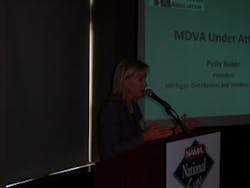Michigan Vending Operators Fight Unfair Tax Proposal
Attendees at the National Automatic Merchandising Association (NAMA) government affairs symposium got an update on the Michigan Vendors & Distributors Association (MVDA) efforts to maintain fair taxation. Polly Reber, the MDVA lobbyist, noted the governor has proposed eliminating an exemption for vended products that would effectively place a 6 percent sales tax on these items.
The state is facing a budget deficit, Reber noted, and must either cut spending or raise revenues. “We have a target on our back,” she said.
The proposed change only applies to food that is not prepared for immediate consumption. The governor wants all food for immediate consumption to be taxed, which she believes includes vended products. “All we’re asking for is a level playing field so we can compete in the marketplace,” Reber said.'
She further noted that if the exemption is eliminated, those consumers who can least afford to pay the tax will have to pay it.
Taxing vending sales is not fair, she said, since vending operators already pay a tax on products when they buy them. “We do pay taxes,” she said. “We are contributing.”
Reber said the governor has called the exemption a loophole.
The association has two lobbying events during the year, Reber said. One is a day at the state capital during which members deliver boxes of candy and snacks to lawmakers and meet with them during a buffet luncheon.
The other event is an annual family picnic to which lawmaker are invited. Lawmakers who come to the event are required to sit in on the legislative meeting. “We talk openly and honestly with the legislators about the issues,” Reber said.
Sandy Larson, NAMA’s western counsel, noted that the California Automatic Vendors Council hosts a legislative day at the state capitol. She said the event requires planning. Members must submit letters to legislators requesting a meeting during the event, then follow up with a phone call. They must also prepare information to give members when they meet with them.
Legislative days give association members a chance to learn how state government works and it allows the lawmaker a chance to learn about the vending industry, Larson said.
Todd Elliott, vice president and general manager of Tomdra Vending and Coffee Service in Tucson, Ariz. and president of the Arizona association, noted that his group installs machines on the capitol lawn with free product in them, as well as an annual legislative breakfast.
